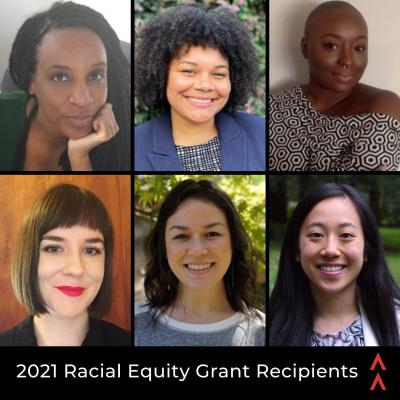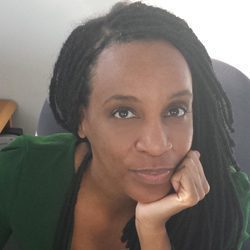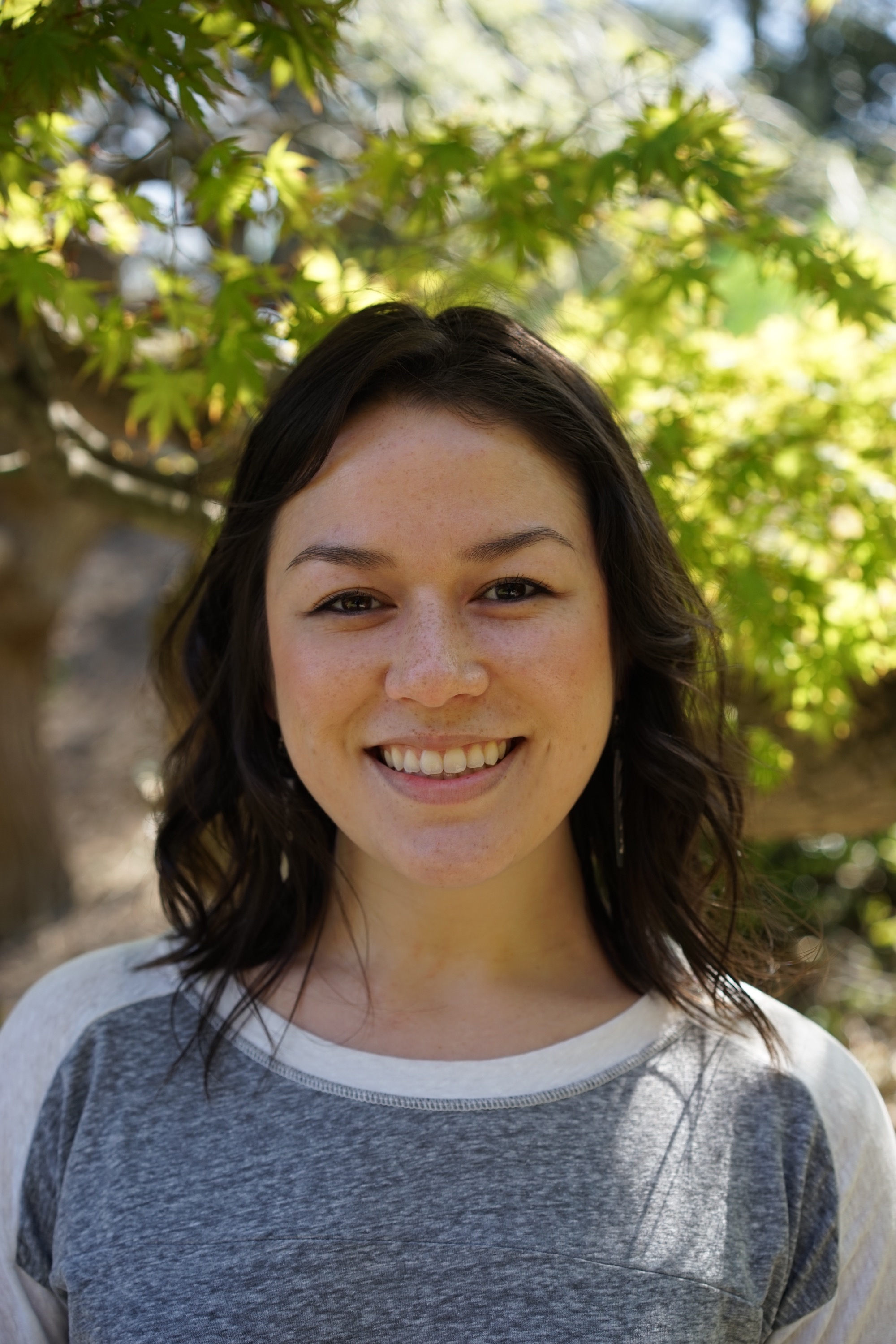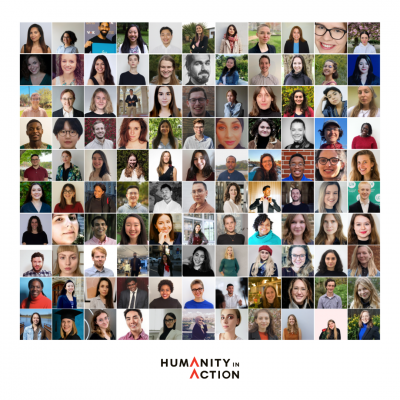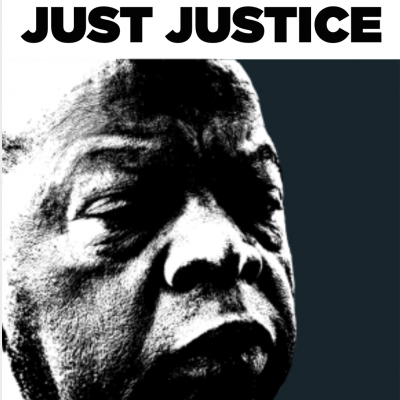Details
Article
Humanity in Action is delighted to announce the recipients of the 2021 Humanity in Action Racial Equity Grant! Senior Fellows Aasha Abdill, Allie Dyer, Caroline James, Chelsea Halstead, Katie Hahn, and Michelle Lo will receive grants to create new initiatives or further their existing projects in the upcoming year that focus on advancing racial justice in the United States.
As we emerge from the conflicting global health and economic crisis brought forward by the COVID-19 pandemic, the following Senior Fellows and projects were selected to further racial equity through research and policy work, social and political advocacy, knowledge exchange, intergenerational healing, and coalition building. The Racial Equity Grant is made possible through the generous support of the William H. Donner Foundation.
Dr. Aasha M. Abdill works with initiatives to center and execute an inclusive and equitable approach to evaluation, strategy and learning in philanthropy, policy, and nonprofit practice. She holds a Master’s in Quantitative Methodology from Columbia University and a Doctorate in Sociology from Princeton University with a Concentration in Organizational Theory, Race and Ethnic studies, and Community Studies. Aasha is the author of Fathering from the Margins, a sociological investigation of the myths and realities of fatherhood in Black communities. For her undergraduate studies, she is a proud alumna of a historically Black college, Spelman College, and the Brooklyn School of Hard Knocks.
WayOut focuses on organizing a safe network for Black travelers across the country while documenting this growing movement. For far too long, Black people have had their movement restricted across the United States and their belongingness in the Great Outdoors challenged or ignored. WayOut supports the growing movement of nature-seekers, campers and nomads asserting their right to travel, explore, and enjoy our country’s vast scenic lands. Inspired by the fearless legacy of the Underground Railroad, WayOut RailRoad is an “above ground” network of campgrounds, way-stations, social media groups, farm and landowners, and businesses that are committed to racial equity and justice and connecting Black people to safe, inclusive and affirming outdoor spaces and experiences. For more information on this scholar-activist project, please visit WayOut’s official website.
Allie is Portland raised, Antigua-rooted medical student, educator, writer, growing healer, community organizer, and recent MPH graduate of Harvard University T.H. Chan School of Public Health with a passion for reproductive justice, decolonial discourse, and the healing of historical and intergenerational trauma. She has a call toward bridging allopathic medicine and traditional wisdoms in service to the healing of and justice for all oppressed under the current colonial and capitalist systems.
When she is not studying allopathic medicine, she continues to organize with Brown Girl Rise–a group by and for young BIPOC girls and femmes in Portland–as well as collaborate with practitioners of African and Afro-Diasporic indigenous cultural technologies to co-create transdisciplinary spaces focused on the healing of historical collective trauma for people of the African Diaspora.
Her project centers community healing processes in practice. From the disproportionate impact of COVID-19 to the murders of George Floyd and Breonna Taylor and the movements that followed, collective and historical trauma has held a heavy weight throughout much of the Black community during the last years. While dominant trauma interventions often fail to fully incorporate culturally-rooted lenses and modalities of trauma healing, this project aims to address this need by further developing and conducting a transdisciplinary 3-day pilot intervention related to historical trauma healing with a group of people of the African Diaspora in Portland, Oregon.
This workshop will be co-facilitated with traditional healer-practitioners and includes education around historical trauma, trauma physiology, as well as teachings on and engagement with indigenous Afro-Diasporic conceptualizations of this trauma and traditional practices of healing. This group intervention portion will be complemented by an ongoing storytelling project that explores and archives stories and teachings related to historical trauma from healer-practitioners of the African Diaspora based throughout the U.S. It is their hope that through both the group work and storytelling portions of this project that they contribute to the development of more robust and nuanced understandings of Black cultural and community-rooted cosmologies, epistemologies, and interventions related to historical trauma.
Caroline started her social justice career as a student activist at The University of Alabama where she worked to create the city’s first Diversity Day celebration. After leaving college, she taught elementary aged children in New Orleans. In 2014, she won Teach for America’s National Sue Lehmann Excellence in Teaching Award. Having moved back to Chicago, she went on to manage the development of teachers through coaching, professional development, and diversity work. Since she has worked as an Assistant Principal, an advisor for the creation of an LGBTQIA school in Chicago and taught GED English classes.
In 2017, she was named a Bill Gates Cambridge Scholar and went on to complete a Master’s in Philosophy of Education at the University of Cambridge. Her graduate research (and lifelong passions) explore diversity and inequity through an education lens. She is also a Humanity in Action Senior Fellow, where she explored equity issues in Poland and France.
Her project “WE The Sojourners” is a multi-social media project where the “isms” that keep us from creating the most equitable societies are deeply examined using research, personal stories and a lot of humor. Designed to be approachable, “WE The Sojourners” is not a political ecosystem, but rather explores the assumptions and gaps that the political stuff can overshadow. The aim of this project is to make deep learning about social justice commonplace (and not simply the musings of academics, activists and politicians.) She hopes that you will join her by checking out her introductory article where she examines why social justice is not working and what she believes is needed to move forward. The project’s introductory article is available today, but “WE The Sojourners” officially launches on November 22nd, 2021.
Chelsea L. Halstead is the Associate Director of the Cornell Center on the Death Penalty Worldwide, where she oversees the center’s strategy, advocacy, and fundraising efforts. Prior to her appointment at CCDPW, Chelsea co-founded the Colibrí Center for Human Rights in Tucson, Arizona. Colibrí combines forensic science with human rights advocacy to identify the remains of people who have died in their attempt to cross the U.S.-Mexico border while calling attention to failed immigration policy. Chelsea helped design the organization’s innovative DNA program, which has facilitated the identification of over 200 previously unidentified human remains. Her work has been recognized in USA Today, The Guardian, The New York Times, The Washington Post, Al Jazeera, and other media. Chelsea holds a B.A. in Geography from the University of Arizona and an M.P.A. from Cornell University.
Her Humanity in Action Racial Equity Project will be in tandem with her work at the Cornell Center on Death Penalty Worlwide (CCDPW) and will focus on advancing its mission through the Alice Project. Through combined research, advocacy, training, and legal representation for women, trans people, and gender minorities facing the death penalty and other extreme sentences like LWOP, the Alice Project works to advocate for the most marginalized individuals within the incarcerated population. The key to this advocacy is calling attention to the intersectional discrimination faced by these individuals before, during, and after trial, and the ways in which this discrimination exposes systemic injustice within the criminal legal system. The Alice Project has spawned The Alice Network, a collaboration between CCDPW, The National Black Women’s Justice Institute, and The Sentencing Project.
The network bridges the gaps between movements for gender, racial, and disability justice while highlighting the unique needs of disabled women, women of color, trans people, and gender non-conforming individuals. Success here will be measured by the number of individual stories told, the number of trainings conducted, and the research published to support systemic change. The end goal is to change the narrative of women, trans people, and gender non-conforming individuals accused of serious crimes, for the benefit of the entire incarcerated population. These efforts center on healing justice in place of punitive carceral punishment. For more information, visit CCDPW’s website.
Katie Hahn is an educator, social worker, and a Humanity in Action Senior Fellow. She and her husband, DJ Hartigan, are working to launch Kindle Education, an intentionally diverse 6th-12th grade public charter school in Jersey City, New Jersey that prioritizes holistic, student-directed learning. They each have over 10 years of experience working in public education. Prior to starting Kindle, Katie supported a portfolio of 17 schools to implement holistic student/family support as part of the country’s largest community schools initiative, while DJ led the school model development and academic intervention efforts for Great Oaks Charter Schools. Both have an M.Ed. in Educational Leadership from the High Tech High Graduate School of Education. Katie also holds an AB in Social Studies from Harvard University and an LMSW from NYU’s Silver School of Social Work.
Kindle Education seeks to build a new model of school that sparks liberation, self-actualization, and the renewal of our common world. By cultivating an equitable community of purposeful individuals who are prepared to navigate our current world and build our future, Kindle will serve as an incubator for young people with diverse identities to develop the skills, knowledge, and mindsets they need to solve the complex problems of the 21st century. The vision for Kindle is being developed using a community co-design process that engages a broad range of stakeholders in reimagining what school can be while building community and problem-solving across lines of difference. For more information visit Kindle’s website and follow Kindle Education on LinkedIn, @KindleEducation on Instagram, and @KindleEducationJC on Facebook.
Michelle Lo is an Asian American educator and learner. As a recent graduate of the Stanford Teacher Education Program (STEP), she teaches high school mathematics in California and is interested in leveraging education as a space for learning and liberation. In particular, Michelle is interested in teaching mathematics as a means of civic engagement and social justice while improving STEM equity for girls, students of color, and multilingual students.
She currently teaches high school in California and facilitates the Equity Team at her school, where the school community is working towards equity and antiracism. This project, “The Humanhood of the Traveling Zines,” is a student-created collective zine that addresses racial injustices in the Bay Area. As part of the zine-making process, Michelle will be inviting local speakers to shed light on local racial issues and workshop ideas with students on the zine. This zine will include stories, pictures, graphs, and other images that express different facets of racial injustice in the Bay Area, such as housing, climate injustice, #Black Lives Matter, #StopAAPIHate, and more.
Students will choose an area of racial injustice and dive deeper into researching a particular racial issue, its history in the Bay Area and broader U.S. context, and share current available data along with actionable steps. The zine’s distribution will serve as a conversation starter and a “jumping off point” for members of the community, especially youth, to talk about racial injustices in the community.
Congratulations to Aasha, Allie, Caroline, Chelsea, Katie, and Michelle! We look forward to updating you on the impact of their work over the next year!

